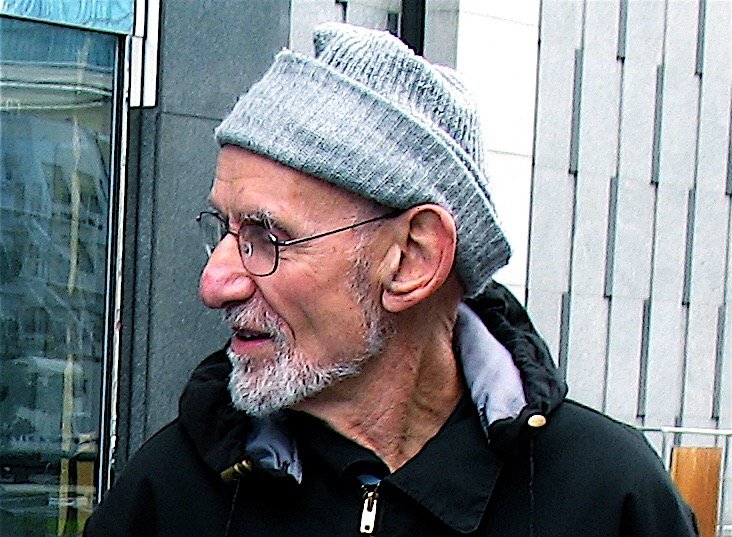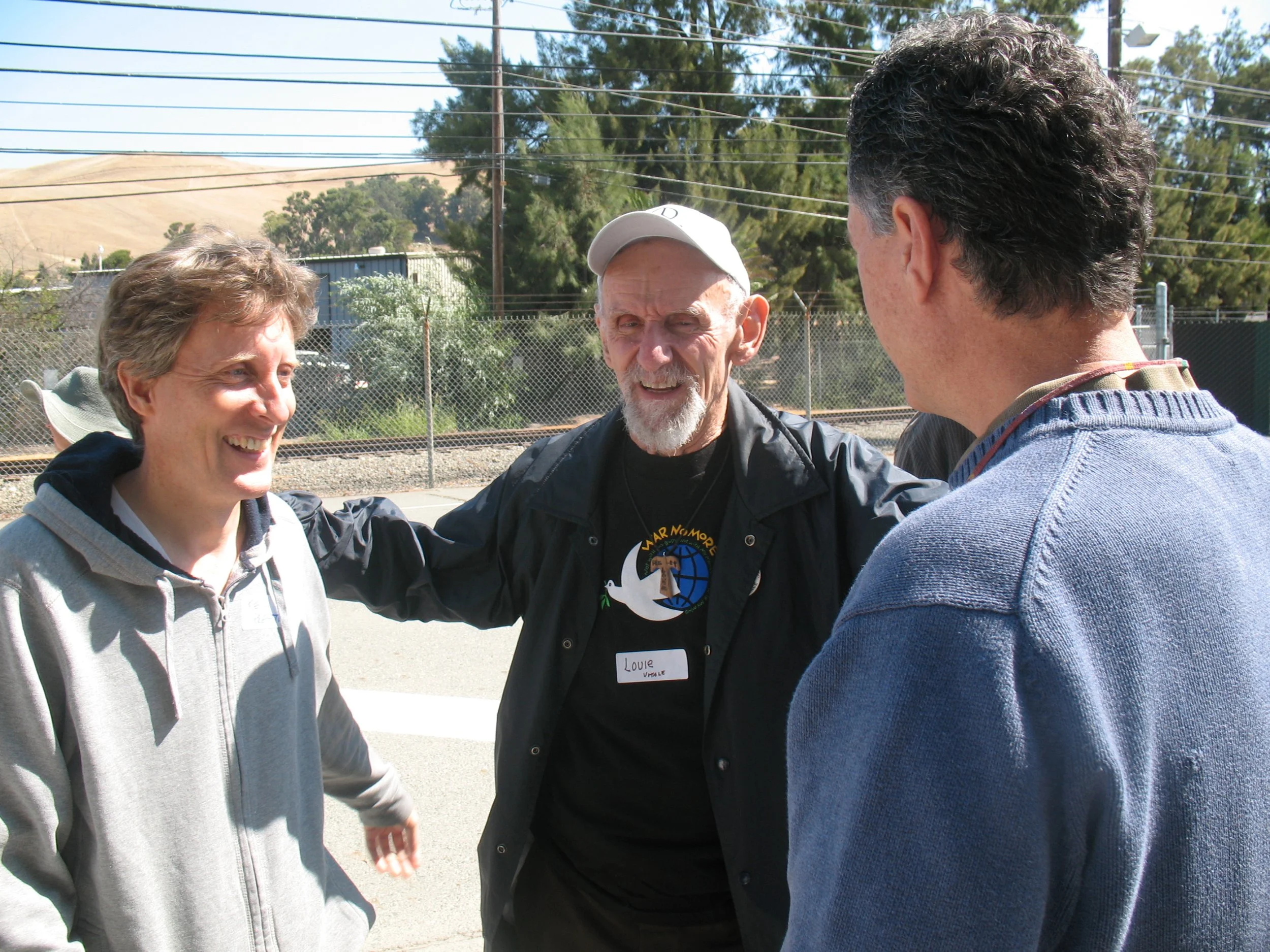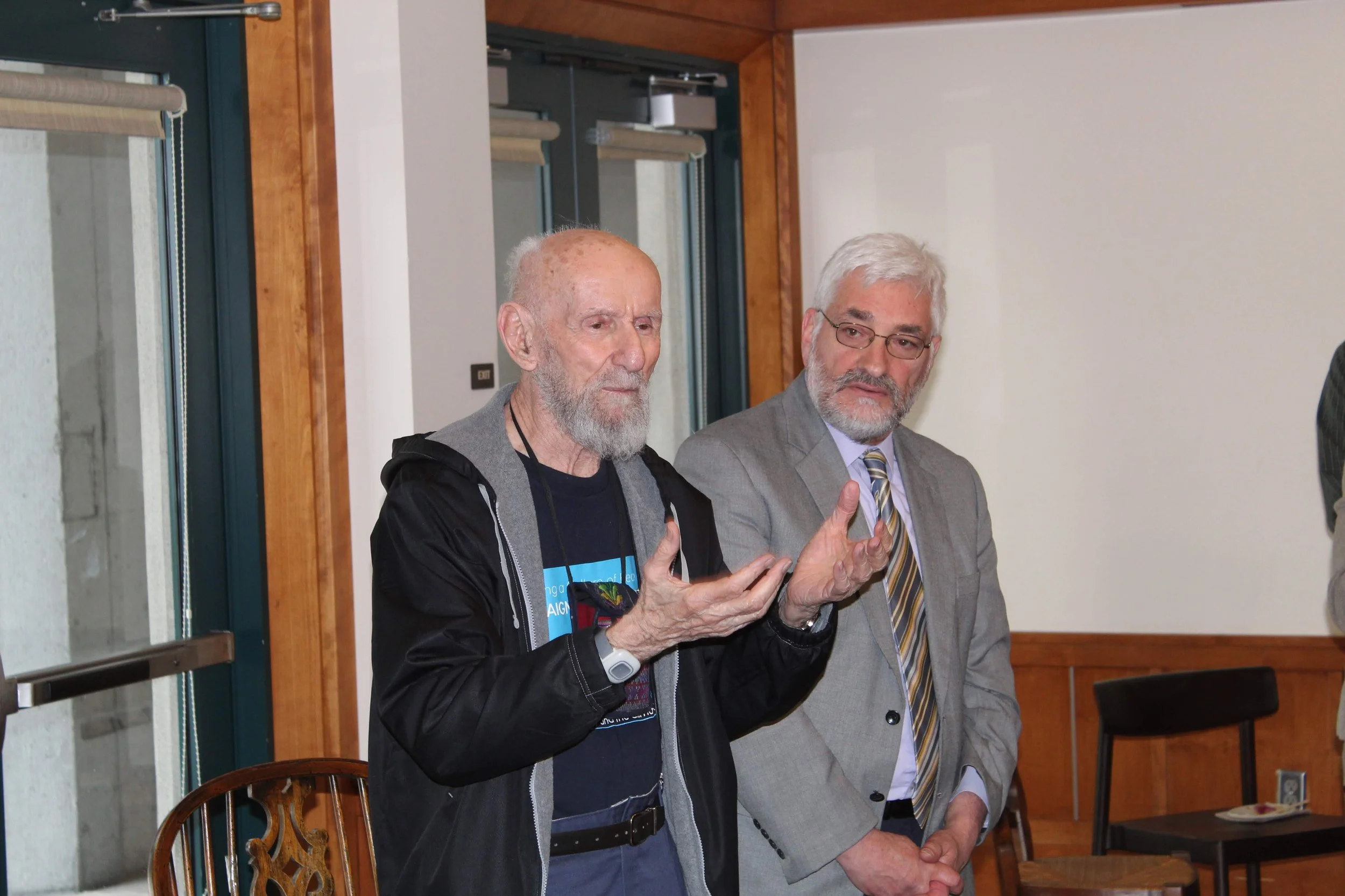Remembering Louie Vitale: A Eulogy
A memorial service for Fr. Louie Vitale, OFM, a co-founder of Pace e Bene, was held at St. Boniface Church in San Francisco, California on Friday, October 6, 2023. Below is the eulogy that Ken Butigan delivered on behalf of his friend and colleague.
Welcome everyone.
It is a great blessing to be gathered together to remember and honor our dear friend and brother, Fr. Louie Vitale OFM. If Louie were here, this would also be his refrain: “Welcome, everyone.”
And so everyone is welcomed:
His family.
His fellow friars.
His dear friends in the movement for justice and peace and nonviolence.
His friends who lived in the Tenderloin and throughout the Bay Area.
His friends who accompanied him in his last years, including Anne Symens-Bucher, Bill Joyce, Sherri Maurin, and Brother Chris.
His friends from across the country and around the world, but also all his non-human friends of the entirety of creation.
And, finally, all the friends that we name the “friends of God,” the communion of saints, all those living and dead who have been called by our nonviolent Creator to love without measure.
Together, all of us, seen and unseen, would be welcomed by our brother Louie into this sacred space, St. Boniface Catholic Church in the Tenderloin, where he ministered for 13 years and where he declared through his actions that this space concretely exemplified the Reign of God, the Beloved Community where all are given shelter, all are given what they need, all are loved.
As many of us know, Louie opened this space for those who had no other space. For those experiencing homelessness or loss or rejection.
But this was also a space for dreaming about another world, and even organizing it.
One time, on a visit to San Francisco after I’d moved away, I was deeply moved by what Louie had done with this space. It was just after the US went to war against Iraq the second time, in 2003, and there was much activism for peace here in this city, and when I arrived at St. Boniface, it seemed that this church was the epicenter of the movement. There were hundreds of people organizing the next action, and the next one after that. Louie was incandescent. He was so alive, and even shouted out something like, “Ken, I think the nonviolent revolution might be here!”
Of course, the nonviolent revolution did not occur at that moment. But when it happens, when we see that gobal, nonviolent shift dismantling everything that stands in the way of the healing of our planet and its inhabitants, we will be compelled to remember all the known and unknown nonviolent saints who have prepared us for that world -- and one of those will be Louie.
The Point of a Eulogy
The purpose of a eulogy, as far as I can tell, is to share “good words” that help us take the measure of a life and then, perhaps, to think about what that life tells us about living our own.
So, in that spirit, I invite us to reflect on the strange and beautiful life Louie lived – and how, what he did, perhaps teaches us something about how we can live our own strange and beautiful life.
I will offer some thoughts about this. But my own take on Louie is necessarily limited.
This is not because I didn’t spend lots of time with him. I first met him in 1984 when we were starting something called the Pledge of Resistance working to end the US wars in Central America. He later hired me at Pace e Bene Nonviolence Service. We taught a course together called “Liberating Nonviolence” thirteen times at the Franciscan School of Theology, and he even co-officiated at my wedding.
Nevertheless, I have only one perspective on Louie Vitale. Most of the rest of us likely have our own, unique take on him. I think that might have something to do with his way of being. I found him, generally speaking, very present. He took you seriously. He listened. And he did whatever was needed to respond. Often this meant he would drop whatever he was doing and “show up.”
The most personal example of this for me was when my brother, Larry, died in Washington State and Louie dropped everything to spend a week with my family in Olympia where we celebrated my brother’s life. Larry had spent much of his life on the streets (in spite of the efforts we all made to support him) and he died on the streets. Louie wanted to be there for us but especially for Larry, a person he had never met but deeply understood. He officiated at the funeral mass, he spent days and days with my mother and sisters and brothers, and he helped distribute Larry’s ashes at Capital Lake in Olympia.
This was just one of the almost endless beads on the rosary of Louie’s life.
Whether that was dropping everything to head off on a people-to-people peace mission in Iran. Dropping everything to take up a 47 day fast to support the Fast for Life in the mid-1980s. Dropping everything to join his fellow clergy in occupying a park in Oakland after the rest of the Occupy activists had been attacked and carted off to jail in 2011. Or dropping everything to support the struggle to keep KPFA radio open when the Berkeley police were putting the announcers under arrest and he crawled under the police van to keep it from moving.
Or dropping everything and engaging in nonviolent civil disobedience, by his count, 400 times.
Of course, all of this may seen strange when we consider the obvious fact that Louie was a Franciscan priest who also served for years as the provincial of the St. Barbara Province.
But Louie saw no contradiction here. In fact, he saw it as marvelously consistent – not only because his life was in keeping with the openness to peace and justice that the Second Vatican Council created, or that his mentors, like Fr. Alan McCoy, revealed in his work with migrants in Stockton. Most of all he saw this consistent with the life of Jesus and the one who, a millennium later, walked in Jesus’ footsteps: Saint Francis of Assisi.
I saw this as he wandered in the Nevada desert. And I would see it when I would come into the small chapel at Pace e Bene’s place on Bartlett Street in Las Vegas at 5 in the morning and find Louie, wrapped in prayer, by himself with God.
Mourning and Rejoicing
Louie’s good friend Fr. John Dear, who is with us here, says that Jesus’ Sermon on the Mount invites us to do two things: to mourn and to rejoice. I think Louie exemplified these two dimensions of the deeply Christian life.
I was recently told a story about Louie by Toby Blomé. Toby and Louie were among a handful of folks who began engaging in nonviolent action at military drone bases in the United States about a decade or so ago, which were conducting lethal remote drone attacks in the Middle East. This included nonviolent civil disobedience at Creech Air Force base north of Las Vegas. One time after they were arrested they were put in a police van, headed to Las Vegas. They were all sitting there in silence, and then Toby saw Louie, dressed in his brown Franciscan habit, begin to weep and then, with tears streaming down his face, he said, over and over again, “The children…The children…The children.”
Louie did not engage in nonviolent action flippantly. It was not a game to him. Or something he just did because he was Louie. He took these actions very seriously and for the deepest reasons, longing to contribute in some way to ending the violence that put children – and everyone else -- in harm’s way.
But he also brought the spirit of joy, to his way of justice and peace.
At the end of one of the nonviolence trainings that Pace e Bene held at Holy Redeemer Center in Oakland which Louie attended, we had a ritual where all the participants in the circle were asked, one at a time to make a little movement with their hands that the rest of us would imitate around the circle, as we played the song “Walking in Your Footsteps,” a Toshi Regan cover of the song by the Police. In that song, part of it goes,
Walking in your footsteps/Walking in your footsteps
They say the meek
Shall inherit the earth
They say the meek
Shall inherit the earth
Walking in your footsteps/Walking in your footsteps
When it came to Louie, he went nuts. he glided around the room, he twisted his body, he flapped his arms, he had the biggest grin on his face, as if he was walking in the footsteps of all the ancestors, as if he was on fire with joy at the great promise, the great hope, that the meek of all people—the rejected, the despised, the ones under the drones and bombs—will, in fact, inherit the earth.
An Equation
Louie was unique. But he also had a hope that all of us could be agents of mourning and joy. Here’s how I think about that. Louie seemed to live out the following simple equation which bolstered his life of mourning and joy:
Love + Clarity + Determination + Hundreds of Arrests =
A Life Well Lived for the Well-Being of All.
Louie was convinced that this was the most human life, and that all of us can create some version of this recipe.
So, for him, LOVE is at the center of everything. It meant everyone is included. Everyone counts.
But then he had to figure out how to put this vision into practice. So he gradually came to a CLARITY about this. For him, it was increasingly clear that Love for All had to be practiced using the most powerful symbol he had at his disposal: his own body. It was not enough to think nice thoughts. It had to somehow be embodied.
But it was not enough to love and to be clear. He also had to go for it. He needed the DETERMINATION to make this real.
And that led to his many nonviolent actions. He came to realize that we all have some power, and he decided he didn’t want his power to prop up systems of oppression, of racism, of war, of injustice. So he had to defy those systems. He had to break the rules. And he had to do that with love and nonviolence, because, for him, protest was a sacred act that saw the sacredness of those who were being destroyed but also, ironically, those doing the destroying.
Conclusion
Many of us have noticed the parallels Louie seemed to live to the life of Saint Francis, the great icon of mourning and joy.
Francis was from a wealthy family. So was Louie.
Francis saw up close the great wound of war. Louie served in the US Air Force, where he refused the order to shoot down a Russian jet that turned out to be a commercial airliner.
Francis abandoned his father’s plan for a life of upward mobility. Louie decided to enter the Franciscan order, upsetting his father greatly, who had expected Louie to take over his lucrative seafood business.
Francis was a peacemaker and so was Louie.
Francis traveled to Egypt to see if the 5th Crusade could be ended, and Louie traveled to Egypt to see if peace with justice was possible in Gaza.
I am thinking of one more parallel. In Andre Vauchez’s book on the life of Francis of Assisi, he says that after Francis died at the Porziuncola outside Assisi in 1226, his followers solemnly carried his body, first to Saint Clare and her community at San Damiano, and then on up the hill to Assisi. He writes that what started in great mourning turned into a great, festive procession of celebration and rejoicing.
Perhaps this can also be true of our gathering today. We begin with mourning at the passing of our great friend – but, perhaps, our mourning can become rejoicing for your life, Louie, and what you have taught us.
And in that spirit, we too, like Louie, can welcome everyone.
Thank you, Louie.






